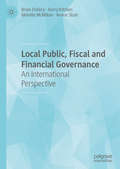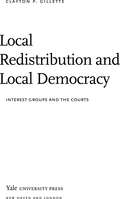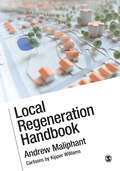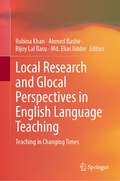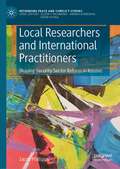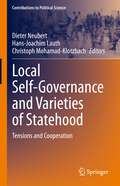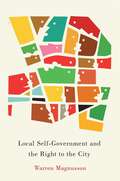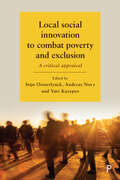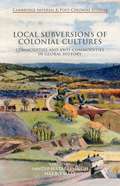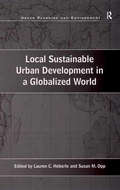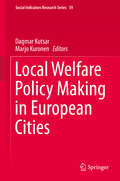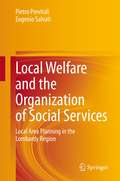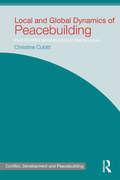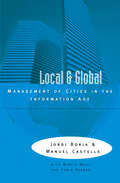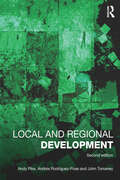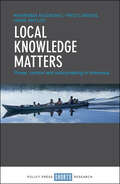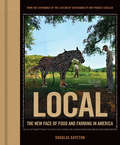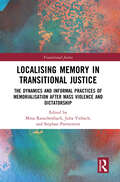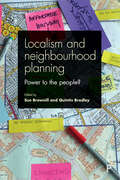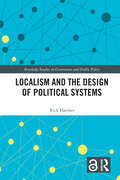- Table View
- List View
Local Public, Fiscal and Financial Governance: An International Perspective
by Anwar Shah Harry Kitchen Melville McMillan Brian DolleryThis book provides a comprehensive treatment of traditional as well as newer topics in local public, fiscal and financial management principles and practices. It covers traditional topics of local public management, local revenue administration with special emphasis on property tax administration, local budgeting and accounting, and methods of capital finance. Newer topics covered include political economy of local government, fiscal rules for local fiscal discipline, local government integrity and performance accountability, and municipal mergers and inter-municipal cooperation based upon relative importance and political, fiscal and administrative autonomy of local governments. The treatment is non-technical and suitable for a wide variety of audiences including scholars, instructors, students, policy advisors, and practitioners.
Local Redistribution and Local Democracy
by Clayton P. GilletteThe traditional theory of urban finance argues against local redistribution of wealth on the assumption that such action is likely to chase away the relatively wealthy, leaving only the impoverished behind. Nevertheless, Clayton P. Gillette observes, local governments engage in substantial redistribution, both to the wealthy and to the poor. In this thoughtful book, Gillette examines whether recent campaigns to enact "living wage" ordinances and other local redistributive programs represent gaps in the traditional theory or political opportunism. He then investigates the role of the courts in distinguishing between these explanations. The author argues that courts have greater capacity to review local programs than is typically assumed. He concludes that when a single interest group dominates the political process, judicial intervention to determine a program's legal validity may be appropriate. But if the political contest involves competing groups, courts should defer to local political judgments.
Local Regeneration Handbook
by Andrew MaliphantLocal regeneration, and action on local issues, is fundamental to the sustainability of local communities. This is especially the case in the UK, with the Government focus on such approaches as Local Enterprise Partnerships and neighbourhood development plans, and further devolution proposals in the pipeline. The Local Regeneration Handbook meets the needs of today′s practising "regeneration workers", broadly including anyone from regeneration partnership or development project officers to housing association neighbourhood officers, parish councillors, or other active local citizens, who all share a concern for the wellbeing of the community where they live or work, and a need to work with others for the best possible future for that community. Containing practical advice, templates, and real-life case studies for different stages in local regeneration, including fundraising, partnership development and project management, as well as support for personal development, and illustrations of key points by cartoonist Kipper Williams, this is an essential guide for anyone in local regeneration.
Local Research and Glocal Perspectives in English Language Teaching: Teaching in Changing Times
by Rubina Khan Ahmed Bashir Bijoy Lal Basu Md. Elias UddinThis book provides an overview of recent trends and developments in the field of English language education. It showcases research endeavors from a heterogenous group of scholars from different parts of the world and brings together perspectives from both experienced and emerging scholars. This book provides a platform for established as well as emerging practitioners and scholars in the field of English Language Teaching to share their research. It synthesizes local expertise and culture with innovative ideas from other contexts and brings theory and practice together in one volume.
Local Researchers and International Practitioners: Shaping Security Sector Reform in Kosovo (Rethinking Peace and Conflict Studies)
by Jacob PhillippsThis book is driven by the question: what role is played by the local security research community in Kosovo’s internationally-led Security Sector Reform? Kosovo’s SSR has been heavily driven by international knowledge rather than the context-sensitive evidence, with negative implications for the legitimacy and sustainability of SSR. Centred on an analysis of an extensive interview survey of international SSR practitioners and local researchers in Kosovo and local research papers, this book highlights how local research has engaged with, challenged and contributed to international SSR. Despite the general experience of local marginalisation, local researchers have an important role to play. Following engagement with local research, international SSR practitioners may consider local context in greater depth and think more critically about SSR implications. This highlights the potentially key role that local researchers can play to support effective post-conflict recovery.
Local Self-Governance and Varieties of Statehood: Tensions and Cooperation (Contributions to Political Science)
by Hans-Joachim Lauth Dieter Neubert Christoph Mohamad-KlotzbachThe debate on governance originates in the OECD world. At the latest since the postcolonial debate, we know that we need to “test” our assumptions under radically different conditions. This book offers an extended perspective of local self-governance by examining cases from South Asia, Africa, and Latin America, together with a study of militias in the USA. The chapters present a wide variety of local actors who pursue different notions of order legitimized by local traditions based on hierarchy or deeply rooted communalism, Islamic theology, or grassroots democracy. Some local actors claim a state-like authority and challenge the territorial state. In such cases, there is no longer “a shadow hierarchy” but opposition to the state. Different violent actors fight for supremacy, and the state is just one actor among others. The empirical studies presented in this book show how different kinds of local self-governance are combined with varieties of statehood, and thus contribute to an understanding of the notion of governance in a fundamental sense that goes beyond the special case of the OECD world.
Local Self-Government and the Right of the City
by Warren MagnussonDespite decades of talk about globalization, democracy still depends on local self-government. In Local Self-Government and the Right to the City, Warren Magnusson argues that it is the principle behind claims to personal autonomy, community control, and national self-determination, and holds the promise of more peaceful politics. Unfortunately, state-centred thinking has obscured understanding of what local self-government can mean and hindered efforts to make good on what activists have called the "right to the city. " In this collection of essays, Magnusson reflects on his own efforts to make sense of what local self-government can actually mean, using the old ideal of the town meeting as a touchstone. Why cannot communities govern themselves? Why fear direct democracy? As he suggests, putting more trust in the proliferating practices of government and self-government will actually make cities work better, and enable us to see how to localize democracy appropriately. He shows that doing so will require citizens and governments to come to terms with the multiplicity, indeterminacy, and uncertainty implicit in politics and steer clear of sovereign solutions. The culmination of a life’s work by Canada’s leading political theorist in the field, Local Self-Government and the Right to the City ranges across topics such as local government, social movements, constitutional law, urban political economy, and democratic theory.
Local Self-Government and the Right to the City (McGill-Queen's Studies in Urban Governance #1)
by Warren MagnussonA timely exploration of the untapped potential for local democracy.
Local Social Innovation to Combat Poverty and Exclusion: A Critical Appraisal
by Stijn Oosterlynck, Andreas Novy & Yuri KazepovBased on more than thirty case studies in eight different countries, this book explores the governance dynamics of local social innovations in the field of poverty reduction. The diverse team of contributors reflect on the trajectory of social innovation in European governance. They illustrate how different governance dynamics and welfare mixes enable or hinder poverty reduction strategies and analyse how they involve a diversity of actors, instruments and resources at different spatial scales. The contributions are based on research motivated by the standstill in the fight against poverty in Europe and the anxiety that conventional macro-social policies are insufficient to deal with the current challenges.
Local Subversions of Colonial Cultures: Commodities and Anti-Commodities in Global History (Cambridge Imperial and Post-Colonial Studies Series)
by Sandip Hazareesingh Harro MaatThe book brings together original, state-of-the-art historical research from several continents and examines how mainly local peasant societies responded to colonial pressures to produce a range of different commodities. It offers new directions in the study of African, Asian, Caribbean, and Latin American societies.
Local Sustainable Urban Development in a Globalized World
by Susan M. Opp'Sustainable development' is a key issue of concern to urban planners across the globe. How it is defined, implemented and measured at the local level remains highly contested and subject to a wide range of external cultural, political and economic pressures. Bringing together leading experts from North America, Europe, the Middle East and SE Asia, this book provides a timely overview of the various methods for understanding and implementing sustainable practices at local levels. In doing so, they present the wide range of local action alternatives available to planners that may be pursued in spite of the constraints generated by globalization processes and highlight the array of public policy options that could reduce the external pressures shaping the possible local alternatives. The book argues that, while local planners and local authorities are willing to act, many are unaware of the range of options available to them. In bringing together these case studies, not only diverse in geographic terms, but also reflecting very different levels of income, general population education, cultural norms, legal systems and government structures, it points out innovations and examples of best practice.
Local Tax Benefits at a Distance: Japan's Hometown Tax Donation Payment (SpringerBriefs in Economics)
by Takaaki Hoda Richard B. DasherThis book discusses the concepts, types, models, and patterns of Japan’s Hometown Tax Donation Payment system, to provide a clear picture of this newly developed unique and innovative fund-raising tool used by municipalities. It also sheds light on the influences that reciprocal gifts provided by each municipality to donors have on local economies by reviewing empirical works and surveys targeting local business owners and local financial institutions. A distinguishing feature of the book is that it introduces a new social finance mechanism that is unique to the Japanese market and could provide policy implications for small and medium-sized enterprises (SMEs) as well as regional development. Furthermore, the book explores the efficacy of the demand–pull approach to support-strengthening SMEs, especially in rural areas. Finally, the book identifies some lessons learned from the system with a view toward advancing research on this phenomenon and making the system efficient and sustainable. As a whole, the book can provide ample benefits to novices, academics, researchers, and policymakers interested in Hometown Tax Donation Payment, an innovative social finance tool.This is an open access book.
Local Welfare Policy Making in European Cities
by Dagmar Kutsar Marjo KuronenThis book focuses on how EU welfare policies are implemented at the local level in 11 European cities and how local policy making addresses women's care responsibilities. The book studies the complex combination of and the relationships between local political processes, policies, institutions, structural conditions and outputs, as well as outcomes for the women's labour market integration. It demonstrates how cultural settings and multi-level governance patterns form the "playground" for local policy makers to formulate their welfare policies concerning service provision. The book further demonstrates how local production systems and the situation of the local labour market influence the prospects that women have in working and caring. EU welfare policy promotes the labour market integration of women as well as gender equality. The provision of adequate care services is vital in supporting women's employment. Within comparative welfare research, the focus has been on the national welfare systems and policies even if care services are overwhelmingly provided by local authorities that in many EU member states enjoy considerable autonomy. This book fills the gap in understanding local welfare policy making from a comparative perspective.
Local Welfare and the Organization of Social Services: Local Area Planning in the Lombardy Region
by Pietro Previtali Eugenio SalvatiThis book discusses local area planning in the Lombardy region of Italy. The book provides valuable insights about the development of local welfare systems and the territorial organization of social services through the analysis of the evolution of the Local Area Plan, which lies at the intersection of sub regional governance and of social services delivery models. Using Lombardy as a case study, this brief analyzes the structural conditions influencing the establishment of Local Area Plans, their effect on inter-municipal cooperation, and the need for possible reforms. The book is organized as follows: the first chapter presents a reconstruction of the national and regional framework, analyzing the structure of ties and opportunities within which Local Area Plans are called to act. The second chapter provides a review of the extant literature on Local Area Plans and introduces the theoretical framework used by the volume. The third chapter details legislation introduced in Lombardy to reform the governance structure of Local Area Plans by supporting a process of reorganization and aggregation. The fourth chapter presents some cases of Local Area Plan aggregation. The final chapter presents the conclusion and some brief considerations about the future of social planning. Providing an empirical analysis of local service delivery, this book will be useful to scholars and practitioners interested in public administration, welfare, local government, non-profit and public organizations, and management.
Local and Global Dynamics of Peacebuilding: Postconflict reconstruction in Sierra Leone (Studies in Conflict, Development and Peacebuilding)
by Christine CubittLocal and Global Dynamics of Peacebuilding examines the complex contributing factors which led to war and state collapse in Sierra Leone, and the international peacebuilding and statebuilding operations which followed the cessation of the violence. This book presents nuanced and contextually specific knowledge of Sierra Leone’s political and war histories, and the outcomes of the implementation of programmes of post-conflict reforms. It embodies an analysis of the complex challenges involved in aligning international norms and values to local expectations and local priorities, and examines the role of local and global actors and structures in attempts to build a strong state and lasting peace. Using a theoretical framework informed by ‘liberal peace’ philosophy, as well as detailed and nuanced empirical evidence from the field, the book constructs a critical analysis of the contemporary global paradigm for building longer-term peace in war-torn, fractured and fragile societies. This book will be of much interest to students of peacebuilding, war and conflict studies, development studies, African politics, and IR/security studies.
Local and Global: The Management of Cities in the Information Age
by Manuel Castells Jordi BorjaThis text challenges the belief that cities will eventually disappear as territorial forms of social organization as new information technologies permit the articulation of social processes without regard for distance, arguing that the specific role of cities will become more important, and proposing that a dynamic and creative relationship be built up between the local and the global. In this way, cities will remain the focus of social organization, political management and cultural expression, equipped to deal with the enormous social and environmental problems of urbanization.
Local and Regional Development
by Andy Pike Andrés Rodriguez-Pose John TomaneyActors and institutions in localities and regions across the world are seeking prosperity and well-being amidst tumultuous and disruptive shifts and transitions generated by: an increasingly globalised, knowledge-intensive capitalism; global financial instability, volatility and crisis; concerns about economic, social and ecological sustainability, climate change and resource shortages; new multi-actor and multi-level systems of government and governance and a re-ordering of the international political economy; state austerity and retrenchment; and, new and reformed approaches to intervention, policy and institutions for local and regional development. Local and Regional Development provides an accessible, critical and integrated examination of local and regional development theory, institutions and policy in this changing context. Amidst its rising importance, the book addresses the fundamental issues of ‘what kind of local and regional development and for whom?’, its purposes, principles and values, frameworks of understanding, approaches and interventions, and integrated approaches to local and regional development throughout the world. The approach provides a theoretically informed, critical analysis of contemporary local and regional development in an international and multi-disciplinary context, grounded in concrete empirical analysis from experiences in the global North and South. It concludes by identifying what might constitute holistic, inclusive, progressive and sustainable local and regional development, and reflecting upon its limits and political renewal.
Local and State Government: Government and Citizenship
by Etta JohnsonIt's about the responsibilities and functions of local and state government.
Local knowledge matters: Power, context and policy making in Indonesia
by Fred Carden Kharisma NugrohoAvailable Open Access under CC-BY-NC licence. This book explores the critical role that local knowledge plays in public policy processes as well as its role in the co-production of policy relevant knowledge with the scientific and professional communities. The authors consider the mechanisms used by local organisations and the constraints and opportunities they face, exploring what the knowledge-to-policy process means, who is involved and how different communities can engage in the policy process. Ten diverse case studies are used from around Indonesia, addressing issues such as forest management, water resources, maritime resource management and financial services. By making extensive use of quotes from the field, the book allows the reader to ‘hear’ the perspectives and beliefs of community members around local knowledge and its effects on individual and community life.
Local: The New Face of Food and Farming in America
by Douglas GayetonCombining stunning visuals with insights and a lexicon of more than 200 agricultural terms explained by today’s thought leaders, Local showcases and explores one of the most popular environmental trends: rebuilding local food movements.When Douglas Gayeton took his young daughter to see the salmon run—a favorite pastime growing up in Northern California—he was devastated to find that a combination of urban sprawl, land mismanagement, and pollution had decimated the fish population.The discovery set Gayeton on a journey in search of sustainable solutions. He traveled the country, photographing and learning the new language of sustainability from today’s foremost practitioners in food and farming, including Alice Waters, Wes Jackson, Carl Safina, Temple Grandin, Paul Stamets, Patrick Holden, Barton Seaver, Vandana Shiva, Dr. Elaine Ingham, and Joel Salatin, as well as everyday farmers, fishermen, and dairy producers.Local: The New Face of Food and Farming blends their insights with stunning collage-like information artworks and Gayeton’s Lexicon of Sustainability, which defines and de-mystifies hundreds of terms like “food miles,” “locavore,” “organic,” “grassfed” and “antibiotic free.” In doing so, Gayeton helps people understand what they mean for their lives. He also includes “eco tips” and other information on how the sustainable movement affects us all every day.Local: The New Face of Food and Farming in America educates, engages, and inspires people to pay closer attention to how they eat, what they buy, and where their responsibility begins for creating a healthier, safer food system in America.
Localising Memory in Transitional Justice: The Dynamics and Informal Practices of Memorialisation after Mass Violence and Dictatorship
by Mina Rauschenbach, Julia Viebach, and Stephan ParmentierThis collection adds to the critical transitional justice scholarship that calls for “transitional justice from below” and that makes visible the complex and oftentimes troubled entanglements between justice endeavours, locality, and memory-making. Broadening this perspective, it explores informal memory practices across various contexts with a focus on their individual and collective dynamics and their intersections, reaching also beyond a conceptualisation of memory as mere symbolic reparation and politics of memory. It seeks to highlight the hidden, unwritten, and multifaceted in today’s memory boom by focusing on the memorialisation practices of communities, activists, families, and survivors. Organising its analytical focal point around the localisation of memory, it offers valuable and new insights on how and under what conditions localised memory practices may contribute to recognition and social transformation, as well as how they may at best be inclusive, or exclusive, of dynamic and diverse memories. Drawing on inter- and multi-disciplinary approaches, this book brings an in-depth and nuanced understanding of local memory practices and the dynamics attached to these in transitional justice contexts. It will be of much interest to students and scholars of memory and genocide studies, peace and conflict studies, transitional justice, sociology, and anthropology.
Localising Power in Post-Authoritarian Indonesia
by Vedi HadizThis book is about how the design of institutional change results in unintended consequences. Many post-authoritarian societies have adopted decentralization-effectively localizing power-as part and parcel of democratization, but also in their efforts to entrench "good governance. " Vedi Hadiz shifts the attention to the accompanying tensions and contradictions that define the terms under which the localization of power actually takes place. In the process, he develops a compelling analysis that ties social and institutional change to the outcomes of social conflict in local arenas of power. Using the case of Indonesia, and comparing it with Thailand and the Philippines, Hadiz seeks to understand the seeming puzzle of how local predatory systems of power remain resilient in the face of international and domestic pressures. Forcefully persuasive and characteristically passionate, Hadiz challenges readers while arguing convincingly that local power and politics still matter greatly in our globalized world.
Localism and Neighbourhood Planning: Power to the People?
by Sue Brownill and Quintin BradleyGovernments around the world are seeing the locality as a key arena for effecting changes in governance, restructuring state/civil society relations and achieving sustainable growth. This is the first book to critically analyse this shift towards localism in planning through exploring neighbourhood planning; one of the fastest growing, most popular and most contentious contemporary planning initiatives. Bringing together original empirical research with critical perspectives on governance and planning, the book engages with broader debates on the purposes of planning, the construction of active citizenship, the uneven geographies of localism and the extent to which power is actually being devolved. Setting this within an international context with cases from the US, Australia and France the book reflects on the possibilities for the emergence of a more progressive form of localism.
Localism and the Design of Political Systems (Routledge Studies in Governance and Public Policy)
by Rick HarmesThis book examines localism as a political idea and policy approach and explains what localism is about, why it is growing in importance and how it relates to other themes in politics. Illustrated with case studies from the United Kingdom, mainland Europe and the Indian sub-continent, the book analyses localism in conceptual and theoretical terms and locates it within the overall landscape of political thought. Key themes covered in the book include place, space and scale; decentralization and devolution; multi-level governance; public value; democracy and empowerment; and political design. With the focus on the bottom-up, constructivist aspects of localism, the book argues that localism is most likely to work successfully in a political order where sovereignty is ‘distributed’ across various social spheres and levels of government. It offers a comprehensive view of localism by synthesizing its various strands and creating a distinctive framework for design and evaluation. This book will be of particular interest to scholars, students and practitioners of localism, particularly within local and regional government, public administration and policy, human and political geography, and urban studies.
Localism and the Design of Political Systems (Routledge Studies in Governance and Public Policy)
by Rick HarmesThis book examines localism as a political idea and policy approach and explains what localism is about, why it is growing in importance and how it relates to other themes in politics.Illustrated with case studies from the United Kingdom, mainland Europe and the Indian sub-continent, the book analyses localism in conceptual and theoretical terms and locates it within the overall landscape of political thought. Key themes covered in the book include place, space and scale; decentralization and devolution; multi-level governance; public value; democracy and empowerment; and political design. With the focus on the bottom-up, constructivist aspects of localism, the book argues that localism is most likely to work successfully in a political order where sovereignty is ‘distributed’ across various social spheres and levels of government. It offers a comprehensive view of localism by synthesizing its various strands and creating a distinctive framework for design and evaluation.This book will be of particular interest to scholars, students and practitioners of localism, particularly within local and regional government, public administration and policy, human and political geography, and urban studies.The Open Access version of this book, available at www.taylorfrancis.com, has been made available under a Creative Commons Attribution-Non Commercial-No Derivatives (CC-BY-NC-ND) 4.0 license.
